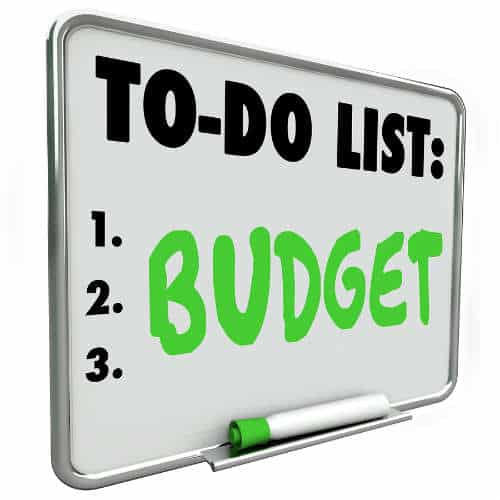Here’s my simple two-step process for creating a basic budget. It’s fast, easy, and anyone can do it.
Step 1: Itemize ALL of Your Expenses
Create a list of everything you spend money on—whether those expenditures are weekly, monthly, or yearly. Use different categories to group all your expenses.
Examples of common budget categories include:
• Childcare
• Credit card payments
• Educational costs or student loans
• Entertainment
• Food
• Housing
• Insurance
• Miscellaneous
• Savings
• Transportation
• Utilities
Obviously, some of these categories may not apply to you. Use whatever is relevant or add additional categories that describe your own spending. Be thorough!
Don’t forget about annual memberships, magazine subscriptions, books, or money spent on gifts for birthdays, graduations, holidays, and special occasions. Your list can be written or entered on a computer spreadsheet.
Step 2: Adjust to Avoid Budget-Wreckers
If your expenses exceed your income, you’ll have to cut back on areas that aren’t necessities.
Stop going out to dinner. Say goodbye (temporarily at least) to that premium cable TV package you have. Forgo shopping trips to the mall. You get the point.
After you quit making luxury purchases or spending money on things that aren’t absolute necessities, if your expenses still surpass your income, you’ll have to make additional adjustments to your budget—this time slimming down on even those “necessities.”
You should also adjust your budget to plan for and/or avoid the common budget-wreckers that everyone faces – things like emergencies that pop up from time to time.
Don’t ever think: “There’s no place else I can cut my budget!”
I hear this lament all the time, and invariably I’m able to show people places in their budget where they do have some flexibility—if they choose to make deeper cuts.
While you’re adjusting your budget to match up your spending and income, the goal is to first get your expenses down so that they’re less than your take-home income.
Then you want to create enough cash flow so that you have some money left over at the end of the month—and you’re not merely living paycheck to paycheck without getting ahead.
Obstacles to Sticking to Your Budget
Hopefully, you can get your budget to the point where you have a positive cash flow.
But sometimes you may find that your while your income is sufficient to cover all your bills, you nevertheless find it difficult to save money or stick to your budget.
There are many reasons why people do not stick to their budgets.
- Some people never truly itemize their expenses. Consequently, their spending exceeds their income.
- Others exclude key categories from their budget. Two key categories in particular that I find people tend to omit from their budget are “savings” and “goals.”
If you want to get ahead, if you want to actually save money, a category for “savings” has to be included in your personal budget. You might also want to achieve certain personal or financial goals, like getting out of debt, starting a business, or purchasing an investment property.
To reach those goals, you have to be willing to consistently set aside money in your budget each month to finance those goals.
• Many people create budgets that are excessively frugal. Nobody can stick to an overly restrictive budget month in and month out.
It is kind of like the dieter or who wants to lose 10 pounds or 20 pounds. The person might say, “I am never going to eat another piece of chocolate cake” or “I am never going to touch another bag of potato chips.” Well, how realistic is that? For most people it is very unrealistic.
You do not want to deprive yourself when you create your budget. So do not create one that is excessively frugal.
• Lastly, some people blow their budgets because they do poor planning or no planning whatsoever. If you don’t plan for possible emergencies, then you’ll always blow our budget when the unexpected happens.
And unfortunately, emergencies occur far more frequently than most people would like.










